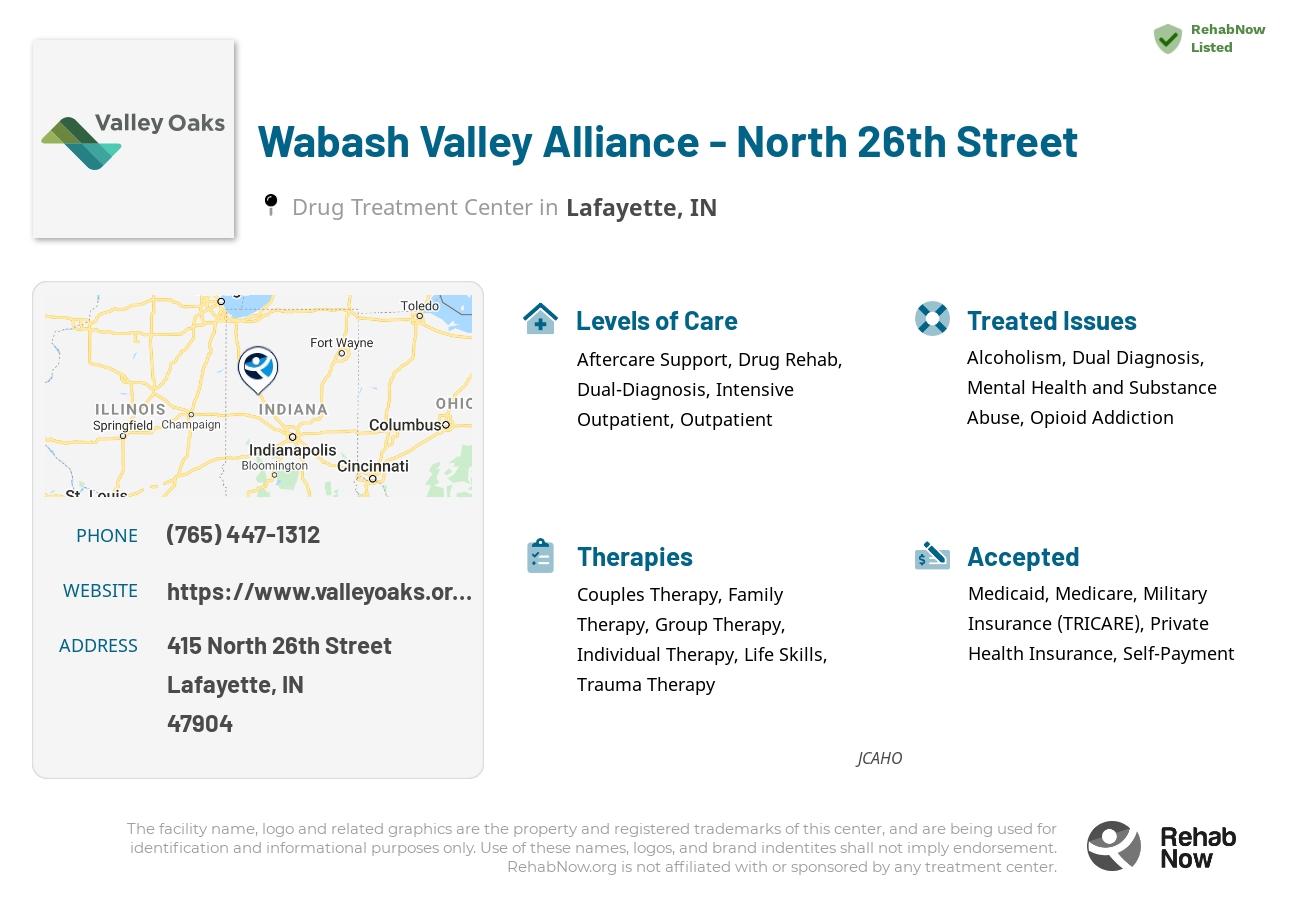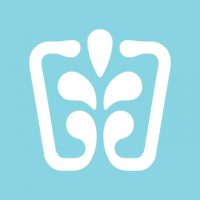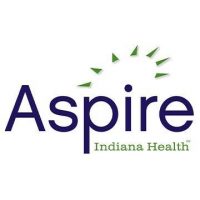Wabash Valley Alliance - North 26th Street
Drug Rehab Center in Lafayette, Indiana
Wabash Valley Alliance, located on North 26th Street in Lafayette, Indiana, is a treatment center that offers evidence-based therapies and medication-assisted treatments to help individuals overcome addiction and substance abuse.
About Wabash Valley Alliance - North 26th Street in Indiana
Wabash Valley Alliance - North 26th Street is an addiction treatment facility located in Lafayette, Indiana. Founded in 1938, this facility specializes in treating individuals suffering from alcoholism, dual diagnosis, opioid addiction, and drug addiction. Wabash Valley Alliance - North 26th Street is accredited by the Joint Commission on Accreditation of Healthcare Organizations (JCAHO) and accepts private health insurance. With a strong affiliation with Wabash Valley Alliance, this addiction treatment center provides comprehensive care and support to individuals seeking recovery.
At Wabash Valley Alliance - North 26th Street, a range of services is offered to address addiction and substance abuse. They provide drug rehab programs, intensive outpatient care, and outpatient levels of care. Additionally, they offer aftercare support to help individuals maintain their sobriety and successfully transition back into their daily lives. With a focus on dual diagnosis, this facility is equipped to address co-occurring mental health issues alongside addiction. Through their evidence-based treatment approaches, Wabash Valley Alliance - North 26th Street strives to provide effective and individualized care for those seeking recovery from addiction.
Genders
Ages
Modality
Additional
Accreditations

JCAHO
Conditions and Issues Treated
Opioid addiction treatment should be done in a medically supervised drug rehab. While taking opioids, users will typically use other substances to enhance the effects of opioids or to reduce the adverse effects of opioid use. Opioid addiction treatment will include detoxification and drug rehab counseling to help both the user and their loved ones learn how to live a successful sober lifestyle.
Treatments such as methadone, buprenorphine, and naltrexone are three medications that can help treat opioid addiction. These drugs work on the brain’s pleasure center and reduce cravings and the effects of illicit opioids such as heroin. These drugs can be either given orally or by injection. Individual drug rehab counseling sessions can be helpful to discuss any questions or concerns with the drug treatment program. This counseling will also help the user set goals for when they finish drug rehab.
Opioid addiction recovery is a long process. Many of the changes to the brain caused by opioid use cannot be undone, but with time and the proper treatment, a person can return to normal function. After detox, treatment will include drug rehab counseling and entering a halfway house or sober living community. Aftercare is critical to long-term recovery, as it helps the user avoid relapsing and entering back into drug rehab.
Levels of Care Offered
This center offers a variety of custom treatment tailored to individual recovery. Currently available are Aftercare Support, Drug Rehab, Dual-Diagnosis, Intensive Outpatient, Outpatient, with additional therapies available as listed below.
Intensive outpatient treatment is a type of comprehensive addiction care. Unlike conventional residential treatment programs, the patients live at home during the recovery process. This means that one can continue working and caring for their families. These also allow people to keep pursuing their studies while also working on their sobriety.
Outpatient treatment can help one transition to normal life from the round-the-clock supervision and treatment available during inpatient treatment. It is an excellent tool to ensure long-term recovery. However, it is essential to note that intensive outpatient treatment in itself does not remove patients from the real-world setting. This means there’s always a higher risk of coming across environmental triggers. To further prevent relapse, an outpatient treatment center should be able to provide ongoing support services.
Once the patient is enrolled in an intensive outpatient treatment program, they will be expected to attend therapy and group meetings daily for a stipulated period. The frequency and duration of each session will depend on the patient’s needs and level of addiction. This can help curb the habit and deal with underlying issues that led to it. Most of these professional treatments are designed to allow patients to structure their daily schedules in a way that is conducive to recovery.
“Outpatient treatment is ideal for those who have a lower intensity addiction. It’s also suitable for those with a supportive environment and those on a tight budget.
Outpatient treatment can be considered the lowest intensity level of addiction treatment. It is ideal for early phase addiction or lower intensity addictions. It may involve weekly sessions instead of daily. Peer group support, 12-step programs, and individual counseling may still be used and anti-addiction medication.
Aftercare support is vital to those who have completed a drug or alcohol treatment program. This support comes in individual and family counseling, treatment of psychiatric and other medical conditions, and medications to reduce cravings. It helps recovering addicts adjust to normal day-to-day activities and can last for a year or longer.
The majority of drug and alcohol addicts who receive aftercare treatment do not relapse. It is estimated that without aftercare, the relapse rate will be between 70 to 90 percent for most people. Aftercare is the final stage in addiction recovery, but it will also help maintain sobriety if relapse does occur.
Therapies & Programs
No single treatment works for all addicts; therefore, the goal of treatment and therapy should be to find what works best for each individual. Some people requiring addiction treatment may only need a few weeks of inpatient care. Others will require long-term residential care. Tolerance and withdrawal levels vary from person to person and thus affect the intensity of the treatment needed.
If an individualized approach to treatment and therapy is not offered, addicts may fail to reap benefits from their efforts. Professionals must customize plans according to their patient’s needs, limitations, and strengths. The goal of all forms of addiction treatment should be for addicts to find healthy ways to cope with their addiction and its underlying causes.
Couples therapy for drug addiction is a unique form of therapy that allows family members to work through the emotional issues of their loved one’s addiction together. Family members can support each other while learning how to cope with the addiction and encourage healthy changes.
Accordingly, couples therapy for drug addiction is designed for an addict and their significant other or spouse. The two will work with a therapist to learn how the addiction affects themselves and the relationship and how to break the negative patterns of behavior that may have developed.
Drug addiction can destroy a person’s life, as well as their family and friends. The loss of one’s ability to choose how to live and behave often leads the addict into depression, anger, guilt, and many emotional problems.
The therapies usually include siblings, children, and parents who are involved in their daily lives. These sessions are vital because they address past issues that may have hampered an addict’s or alcoholic’s recovery and provide support at a crucial time!
One of the most critical aspects of family therapy is helping addicts’ loved ones see their situation in a new light. It’s also one of the most challenging things a family can do when a loved one struggles with addiction or alcoholism.
Group therapy is held in a safe, controlled setting where patients can feel comfortable sharing their struggles and gaining perspective through shared conversations. It takes place in a group rather than one on one to prevent feelings of isolation or being unique in their situation while creating an environment for addicts at Wabash Valley Alliance - North 26th Street to develop fellowship, accountability, and support. Group therapy is an important tool in recovery that prevents cravings that prompt a return to active addiction.
This type of therapy involves the use of a variety of therapeutic techniques to help addicts recover from past traumas that might have triggered their substance abuse. During these sessions, therapists will work with the addict to address painful memories and learn how to cope effectively with stressors as they arise.
During these types of sessions, therapists will typically focus on three main goals:
- Identifying and expressing painful emotions associated with past traumas.
- Reducing the effects of stress on an addict’s life by developing more effective coping mechanisms.
- Developing healthy ways of thinking about stressful situations that can help addicts avoid substance abuse issues in the future.
This type of therapy is typically used in conjunction with other types of addiction treatment services. By identifying and dealing with the root cause of addiction, most addicts can overcome their cravings and prevent relapse once they leave rehab.
Many different types of addiction treatment services exist to help addicts safely get sober, but it’s important for recovering individuals to find a therapist or support group that will help them address the root cause of their addiction.
Life skills training is beneficial for addicts in recovery because it helps them learn how to take care of themselves and improve their quality of life, which can promote feelings of purpose and motivation.
This type of treatment works by teaching individuals life-enhancing skills that support positive living, including:
- Healthy lifestyle habits
- Skills to effectively manage stress
- Effective communication skills to help them get their needs met without turning to drugs or alcohol
- Money management and budgeting skills so they can continue to take care of themselves after treatment ends.
Payment Options Accepted
For specific insurance or payment methods please contact us.
Is your insurance accepted?
Ask an expert, call (888) 674-0062
Wabash Valley Alliance Associated Centers
Discover treatment facilities under the same provider.
- Wabash Valley Alliance - 610 Main Street in Lafayette, IN
- Wabash Valley Alliance - Rensselaer in Rensselaer, IN
- Wabash Valley Alliance - Attica in Attica, IN
- Wabash Valley Alliance - Crawfordsville in Crawfordsville, IN
- Wabash Valley Alliance - Delphi in Delphi, IN
Learn More About Wabash Valley Alliance Centers
Additional Details
Specifics, location, and helpful extra information.
Lafayette, Indiana 47904 Phone Number(765) 447-1312 Meta DetailsUpdated November 25, 2023
Staff Verified
Wabash Valley Alliance - North 26th Street Patient Reviews
There are no reviews yet. Be the first one to write one.
Lafayette, Indiana Addiction Information
The state of Indiana ranks 14th in the nation for drug abuse, but 17th for drug overdoses. The state has many high-quality rehabilitation centers, but reports show that there are about 20 deaths per 100,000 people. This is due to its location making it a drug trafficking haven, where many drugs are further distributed into the country.
Lafayette, Indiana, has a worse drug abuse problem. The percentage of people aged 12 and older who reported using an illicit drug was 9.5 in Lafayette. This means a higher than average rate of drug abuse in Lafayette. Of those 1,946 drug overdose deaths, 1,416 (73%) were due to opioids. There are many support groups and rehab centers that can help you get your life back on track.
Treatment in Nearby Cities
- Rockport, IN (175.7 mi.)
- Kendallville, IN (109.5 mi.)
- Evansville, IN (173.5 mi.)
- Decatur, IN (105.6 mi.)
- Logansport, IN (35.4 mi.)
Centers near Wabash Valley Alliance - North 26th Street
The facility name, logo and brand are the property and registered trademarks of Wabash Valley Alliance - North 26th Street, and are being used for identification and informational purposes only. Use of these names, logos and brands shall not imply endorsement. RehabNow.org is not affiliated with or sponsored by Wabash Valley Alliance - North 26th Street.




